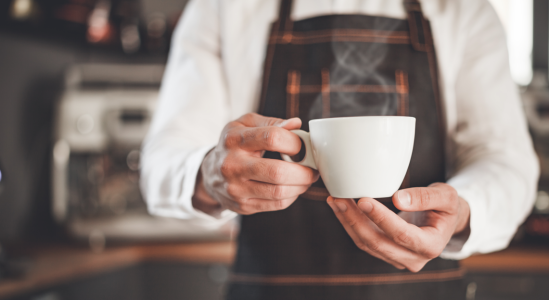Morning coffee could soon cost $10—discover why prices skyrocket!
By
- Replies 22
We cherish our morning ritual of grabbing coffee to kickstart the day. It's a cultural staple, a moment of pleasure, and, for many, a necessary fuel.
However, the price of your daily brew could be on the rise, not just by a few cents. We're talking about the possibility of a $10 coffee, and here's why.
Richard Forbes, the chief executive of Independent Food Distributors Australia, has sounded the alarm on behalf of the 60,000 cafes, restaurants, pubs, and clubs they supply.
Over the past three years, food distributors have seen a staggering 30 per cent increase in food costs.
'We’ve all seen the price of beverages and food rise over the last two or three years,’ Mr Forbes expressed concern.
‘That’s not going to get any better until we start doing something to rein in the costs of business,'
‘We can see it getting to a $10 cup of coffee if things don’t improve … and if things aren’t done to stabilise the cost of business.’
In addition to food, Mr Forbes noted that those in the supply chain are experiencing increases in expenses such as rent, insurance, petrol, and energy.
‘Our average members are facing energy bills of $25,000 per month – not per annum, per month,’ he continued.
‘All of those costs have to be absorbed. And at the end of the day, when you have rising energy costs, insurance, rents, fuel and labour costs in the beginning of the supply chain down to the end of it, then the people that end up paying more for their coffees, their piece of carrot cake, their meal at a restaurant, their parmigiana at a pub, are the consumers.’
Mr Forbes emphasised that cafes should not be blamed for price hikes, as they merely try to survive in an unviable operating environment.
‘They are not increasing prices because they want to make more money,’ he said.
‘They are only raising the prices of their products to survive. It is as simple as that.’
‘And if we don’t see the sort of relief that that we need, then the prices of your everyday out-of-home products is just going to continue to rise.’
Forbes urged state and federal governments to take urgent steps to improve the business operating environment.
‘The government acknowledges that small businesses, which make up 97 per cent of all businesses, are the engine room of our economy, so the government needs to follow that up with action.’ he stated.
‘We need cheaper energy, and we need it now.’
Payroll tax, in particular, is a burden that needs to be addressed to prevent the government from giving struggling businesses insufficient stop-gap measures.
‘The government needs to work with the states to understand the impact that payroll tax has on businesses. Handing a few $100 to a small business cafe or restaurant will not solve the problem.’ Forbes added.
‘Whatever you do, go and support your local cafe, your local restaurant, your local pub, get out there and try your hardest just to spend whatever you can.’
According to the Australian Securities & Investments Commission, nearly 1,600 businesses in the accommodation and food services sector went under in the past financial year.
The Australian Small Business Ombudsman's Small Business Matters 2023 report also paints a bleak picture: 43 per cent of small businesses make no profit.
Several establishments have been closed recently.
WiseGuise Pizza, established in the Launceston suburb of Mowbray in 2015, announced on social media that it could not continue due to ongoing decline.
‘It is with heavy hearts that we announce the immediate closure of our pizza stores in Burnie and Devonport,’ the management said.
‘Unfortunately due to incredibly tough economic conditions along with the rising costs of running a family business we have had to make this difficult decision.’
‘Despite all our efforts, recent times have shown a constant decline, and while the three original stores continue to perform well, the stores on the coast struggle to remain viable.’
In New South Wales, Sydney wellness brand Orchard St. stunned fans by announcing its closure last weekend, ending a decade-long run.
‘The team, our customers, the businesses we collaborate with mean everything to us. We feel like we’ve let so many people down – this was never part of our plan.’ Founder Kirsten Shanks announced.
The accommodation and food services sector is second only to the construction industry in insolvency rates.
The trend is alarming, with 1,751 insolvencies in the 11 months through May, compared to 1,127 in the same period a year ago and 713 in the previous period.
 How are you supporting local businesses during these challenging times? Share your thoughts and experiences in the comments below.
How are you supporting local businesses during these challenging times? Share your thoughts and experiences in the comments below.
However, the price of your daily brew could be on the rise, not just by a few cents. We're talking about the possibility of a $10 coffee, and here's why.
Richard Forbes, the chief executive of Independent Food Distributors Australia, has sounded the alarm on behalf of the 60,000 cafes, restaurants, pubs, and clubs they supply.
Over the past three years, food distributors have seen a staggering 30 per cent increase in food costs.
'We’ve all seen the price of beverages and food rise over the last two or three years,’ Mr Forbes expressed concern.
‘That’s not going to get any better until we start doing something to rein in the costs of business,'
‘We can see it getting to a $10 cup of coffee if things don’t improve … and if things aren’t done to stabilise the cost of business.’
In addition to food, Mr Forbes noted that those in the supply chain are experiencing increases in expenses such as rent, insurance, petrol, and energy.
‘Our average members are facing energy bills of $25,000 per month – not per annum, per month,’ he continued.
‘All of those costs have to be absorbed. And at the end of the day, when you have rising energy costs, insurance, rents, fuel and labour costs in the beginning of the supply chain down to the end of it, then the people that end up paying more for their coffees, their piece of carrot cake, their meal at a restaurant, their parmigiana at a pub, are the consumers.’
Mr Forbes emphasised that cafes should not be blamed for price hikes, as they merely try to survive in an unviable operating environment.
‘They are not increasing prices because they want to make more money,’ he said.
‘They are only raising the prices of their products to survive. It is as simple as that.’
‘And if we don’t see the sort of relief that that we need, then the prices of your everyday out-of-home products is just going to continue to rise.’
Forbes urged state and federal governments to take urgent steps to improve the business operating environment.
‘The government acknowledges that small businesses, which make up 97 per cent of all businesses, are the engine room of our economy, so the government needs to follow that up with action.’ he stated.
‘We need cheaper energy, and we need it now.’
Payroll tax, in particular, is a burden that needs to be addressed to prevent the government from giving struggling businesses insufficient stop-gap measures.
‘The government needs to work with the states to understand the impact that payroll tax has on businesses. Handing a few $100 to a small business cafe or restaurant will not solve the problem.’ Forbes added.
‘Whatever you do, go and support your local cafe, your local restaurant, your local pub, get out there and try your hardest just to spend whatever you can.’
According to the Australian Securities & Investments Commission, nearly 1,600 businesses in the accommodation and food services sector went under in the past financial year.
The Australian Small Business Ombudsman's Small Business Matters 2023 report also paints a bleak picture: 43 per cent of small businesses make no profit.
Several establishments have been closed recently.
WiseGuise Pizza, established in the Launceston suburb of Mowbray in 2015, announced on social media that it could not continue due to ongoing decline.
‘It is with heavy hearts that we announce the immediate closure of our pizza stores in Burnie and Devonport,’ the management said.
‘Unfortunately due to incredibly tough economic conditions along with the rising costs of running a family business we have had to make this difficult decision.’
‘Despite all our efforts, recent times have shown a constant decline, and while the three original stores continue to perform well, the stores on the coast struggle to remain viable.’
In New South Wales, Sydney wellness brand Orchard St. stunned fans by announcing its closure last weekend, ending a decade-long run.
‘The team, our customers, the businesses we collaborate with mean everything to us. We feel like we’ve let so many people down – this was never part of our plan.’ Founder Kirsten Shanks announced.
The accommodation and food services sector is second only to the construction industry in insolvency rates.
The trend is alarming, with 1,751 insolvencies in the 11 months through May, compared to 1,127 in the same period a year ago and 713 in the previous period.
Key Takeaways
- Independent Food Distributors Australia alerted that Aussies may soon pay up to $10 for a coffee due to a 30 per cent increase in food costs over the last three years.
- The food distributor group's chief, Richard Forbes, warns of rising business costs, including rent, insurance, petrol, and energy.
- Nearly 1600 hospitality businesses in Australia have closed in the past financial year as rising operational costs make many small businesses unprofitable.
- The group calls for urgent government action to lower energy costs and tax reform whilst encouraging Australians to continue supporting local food establishments.









